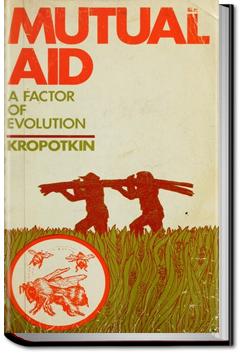UNLIMITED Audiobooks and eBooks
Over 40,000 books & works on all major devices
Get ALL YOU CAN for FREE for 30 days!
Mutual Aid: A Factor of Evolution
Peter Kropotkin
Book Overview:
Mutual Aid: A Factor of Evolution is a book by Peter Kropotkin on the subject of mutual aid, written while he was living in exile in England.Written partly in response to Social Darwinism and in particular to Thomas H. Huxley’s Nineteenth Century essay, The Struggle for Existence, Kropotkin’s book drew on his experiences in scientific expeditions in Siberia to illustrate the phenomenon of cooperation. After examining the evidence of cooperation in nonhuman animals, “savages,” “barbarians,” in medieval cities, and in modern times, he concludes that cooperation and mutual aid are as important in the evolution of the species as competition and mutual strife, if not more so. (Summary by Wikipedia)
Mutual Aid: A Factor of Evolution is a book by Peter Kropotkin on the subject of mutual aid, written while he was living in exile in England.Written partly in response to Social Darwinism and in particular to Thomas H. Huxley’s Nineteenth Century essay, The Struggle for Existence, Kropotkin’s book drew on his experiences in scientific expeditions in Siberia to illustrate the phenomenon of cooperation. After examining the evidence of cooperation in nonhuman animals, “savages,” “barbarians,” in medieval cities, and in modern times, he concludes that cooperation and mutual aid are as important in the evolution of the species as competition and mutual strife, if not more so. (Summary by Wikipedia)
How does All You Can Books work?
All You Can Books gives you UNLIMITED access to over 40,000 Audiobooks, eBooks, and Foreign Language courses. Download as many audiobooks, ebooks, language audio courses, and language e-workbooks as you want during the FREE trial and it's all yours to keep even if you cancel during the FREE trial. The service works on any major device including computers, smartphones, music players, e-readers, and tablets. You can try the service for FREE for 30 days then it's just $19.99 per month after that. So for the price everyone else charges for just 1 book, we offer you UNLIMITED audio books, e-books and language courses to download and enjoy as you please. No restrictions.
The habit of coming together for dancing and of decorating the places where the birds habitually perform their dances is, of course, well known from the pages that Darwin gave to this subject in The Descent of Man (ch. xiii). Visitors of the London Zoological Gardens also know the bower of the satin bower-bird. But this habit of dancing seems to be much more widely spread than was formerly believed, and Mr. W. Hudson gives in his master-work on La Plata the most interesting description, which must be read in the original, of complicated dances, performed by quite a number of birds: rails, jacanas, lapwings, and so on.
The habit of singing in concert, which exists in several species of birds, belongs to the same category of social instincts. It is most strikingly developed with the c. . . Read More
Try now for FREE!

"Love your service - thanks so much for what you do!"
- Customer Cathryn Mazer
"I did not realize that you would have so many audio books I would enjoy"
- Customer Sharon Morrison
"For all my fellow Audio Book & E-Book regulars:
This is about as close to nirvana as I have found!"
- Twitter post from @bobbyekat



Community Reviews
Peter Kropotkin is one of the most noteworthy anarchist thinkers over the last two centuries. As with other political thinkers, so, too, with Kropotkin--his analysis of human nature is critical for understanding his overall philosophical position. For his view of human nature, "Mutual Aid" is a key
Kropotkin argues that mutual aid, co-operation, solidarity with one’s neighbors, sociability, have played the leading parts in human evolution, not competition. The Darwinian struggle for survival has been with the environment, not with other people. Man is not the warlike being he is claimed to be.
As clear, relevant and powerful as the day it was written; if not more desperately needed in our present day.
Mutual aid is our evolutionary heritage and ONLY path for the future. We are not meant to struggle to survive all alone but to thrive together.
Paradigm shifted.
------------
"Man is no exce
En tiempos del individualismo, la competitividad, el aislamiento social, el capitalismo neoliberal y la ley del más fuerte, es imprescindible que nos recuerden que esta tendencia no es ni mucho menos natural. El apoyo mutuo, tal como se recoge en esta obra profundamente documentada, es el mayor éxit
I was expecting more from this book.... I mean, I certainly appreciated Kropotkin's claims that seemed to reject a lot of what we hear about evolution (and its applications to human societies)--ie, that, within the realm of adaptability, etc., mutual aid is as important (if not moreso) than struggle
This book is made up of separate essays written over several years illustrating the natural tendency to organize around institutions of mutual aid. The essays each focus on mutual aid amongst one of the following: 1)animals 2)"savages"-primitive societies 3)"barbarians"-agrarian societies across Eur
I'd only heard of him as an anarchist until I began to read about emotion & the beginnings of ethics in animals -- in such authors as Frans de Waal -- where he was always mentioned as a forerunner. One of those books sent me to Darwin Without Malthus: The Struggle for Existence in Russian Evolutiona